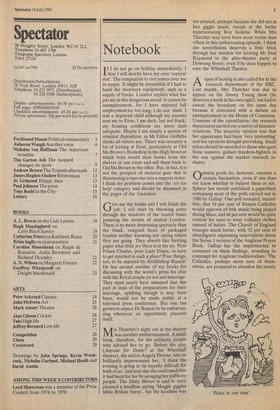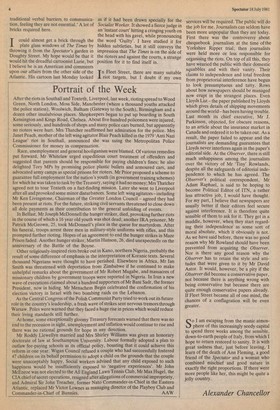Notebook
If I do not go on holiday immediately, I fear I will shortly have my own 'copycat riot'. The temptation to riot comes over me in surges. It might be irresistible if I had to hand the necessary equipment, such as a supply of bricks. I cannot explain what has put me in this dangerous mood. It cannot be unemployment, for I have enjoyed full employment for too long; I do not think I was a deprived child although my parents sent me to Eton; I am dark, but not black; my housing conditions are more than adequate. Maybe I am simply a person of criminal disposition, as Mr Eldon Griffiths thinks all rioters are. There was certainly a lot of looting at Eton, particularly at Old Ma Brown's Bookshop in the High Street at which boys would steal books from the shelves in one room and sell them back to Old Ma Brown in the other. But, in fact, it is not the prospect of material gain that is threatening to turn me into a copycat rioter. I think my problem comes into the 'cry for help' category and should be discussed in the pages of the Guardian.
Give me the bricks and I will finish the job. I will start by throwing some through the windows of the tourist buses jamming the streets of central London. There is no more depressing spectacle than the blank, resigned faces of packaged tourists neither knowing nor caring where they are going. They absorb like blotting paper what little joy there is in the air. Poor Prince Charles, poor Lady Diana, to have to get married in such a place! Poor things, too, to be married by Archbishop Runcie! He has earned another of my bricks for discussing with the world's press his chat with the Royal couple on sex and marriage. They must surely have assumed that this part at least of the preparations for their marriage, uplifting though it may have been, would not be made public at a televised press conference. But one has grown to expect Dr Runcie to be embarrassing whenever an opportunity presents itself.
Mrs Thatcher's night out at the theatre was another embarrassment. A small brick, therefore, for the publicity people who advised her to go. Before the play (Anyone for Denis? at the Whitehall theatre), she said to Angela Thorne, who so brilliantly impersonates her, 'I think the evening is going to be equally difficult for both of us', and next day she confirmed that it had been for her by savaging her publicity people. The Daily Mirror is said to have planned a headline saying 'Maggie giggles while Britain burns', but the headline was not printed, perhaps because she did not in fact giggle much, except at the butler impersonating Roy Jenkins. While Mrs Thatcher may have been more victim than villain in this embarrassing episode, I think she nevertheless deserves a little brick through her window for inviting Mr Paul Raymond to the after-theatre party at Downing Street, even if he does happen to own the Whitehall Theatre.
Aspot of looting is also called for at the research department of the BBC. Last month, Mrs Thatcher was due to appear on the Jimmy Young show (he deserves a brick in his own right), but had to cancel the broadcast on the same day because it coincided with a debate on unemployment in the House of Commons. Unaware of the cancellation, the research department carried out a survey of listeners' reactions. The majority opinion was that her appearance had been 'very interesting' and her opinions thought-provoking. Small prizes should be awarded to those who gave these answers, gallant freedom-fighters in the war against the market research industry.
Opinion pools do, however, exercise a certain fascination, even if one does not know whether to believe them or not. Sphere last month published a paperback containing most of the polls carried out in 1980 by Gallup. One poll revealed, incredibly, that 54 per cent of Roman Catholics would approve of folk music being played during Mass, and 46 per cent would be quite content for nuns to wear ordinary clothes instead of habits. The Church of England emerges much better, with 52 per cent of churchgoers expressing reservations about the Series 3 version of the Anglican Prayer Book. Gallup has the impertinence to comment on these findings, revealing its contempt for Anglican traditionalism: 'The Catholics, perhaps more sure of themselves, are prepared to abandon the purely traditional verbal barriers to communication, feeling they are not essential.' A lot of bricks required here.
Icould almost get a brick through the plate glass windows of The Times by throwing it from the Spectator's garden in Doughty Street. My hope would be that it would hit the dreadful cartoonist Lurie, but I believe he is an American and comments upon our affairs from the other side of the Atlantic. His cartoon last Monday looked as if it had been drawn specially for the Socialist Worker. It showed a fierce judge in an 'instant court' hitting a cringing youth on the head with his gavel, while pronouncing the word 'Guilty'. I have studied it for hidden subtleties, but it still conveys the impression that The Times is on the side of the rioters and against the courts, a strange position for it to find itself in.
In Fleet Street, there are many suitable riot targets, but I doubt if my own services will be required. The public will do the job for me. Journalists can seldom have been more unpopular than they are today. First there was the controversy about chequebook journalism at the time of the Yorkshire Ripper trial; then journalists were held more or less responsible for organising the riots. On top of all this, they have wearied the public with their domestic squabbles and with their vanity. Their claims to independence and total freedom from proprietorial interference have begun to look presumptuous and tatty. Rows about how newspapers should be managed now erupt in the strangest places. Even Lloyds List — the paper published by Lloyds which gives details of shipping movements around the world— has been having trouble. Last month its chief executive, Mr J. Parkinson, objected, for obscure reasons, to an article about the insurance market in Canada and ordered it to be taken out. As a result, the paper failed to appear and the journalists are demanding guarantees that Lloyds never interferes again in the paper's editorial side. At the Observer, there is still much unhappiness among the journalists over the victory of Mr 'Tiny' Rowlands, despite all the safeguards of editorial independence to which he has agreed. The Observer's political correspondent, Mr Adam Raphael, is said to be hoping to become Political Editor of ITN, a rather less attractive job, I would have thought. For my part, I believe that newspapers are usually better if their editors feel secure against interference. It is therefore quite sensible of them to ask for it. They get in a muddle, however, when they start regarding their independence as some sort of moral absolute, which it obviously is not. As we have said before, there was no good reason why Mr Rowland should have been prevented from acquiring the Observer. Nor is there any good reason why the Observer has to retain the style and attitudes that were given to it by Mr David Astor. It would, however, be a pity if the Observer did become a conservative paper, not because there is anything wrong with being conservative but because there are quite enough conservative papers already. If Fleet Street became all of one mind, the chances of a conflagration will be even greater.
C o I am escaping from the manic atmos phere of this increasingly seedy capital to spend three weeks among the sensible, down-to-earth people of Italy, from which I hope to return restored to sanity. It is with great sadness that, just before leaving, I learn of the death of Ann Fleming, a good friend of the Spectator and a woman who combined mischief and good nature in exactly the right proportions. If there were more people like her, this might be quite a jolly country.
Alexander Chancellor



































 Previous page
Previous page